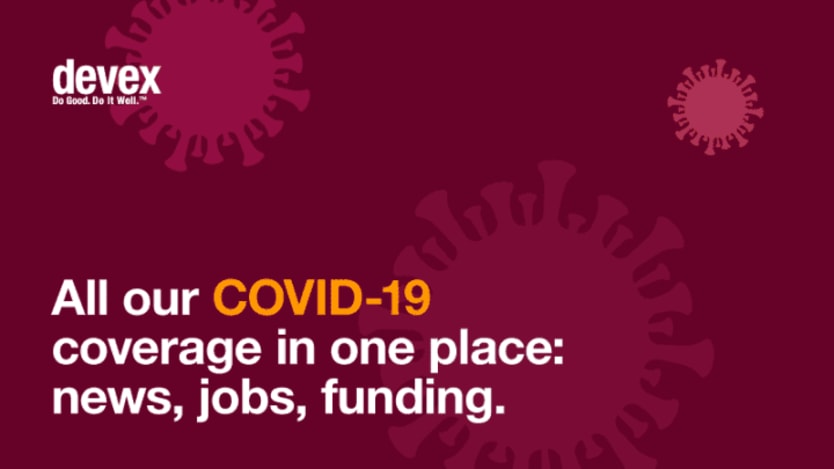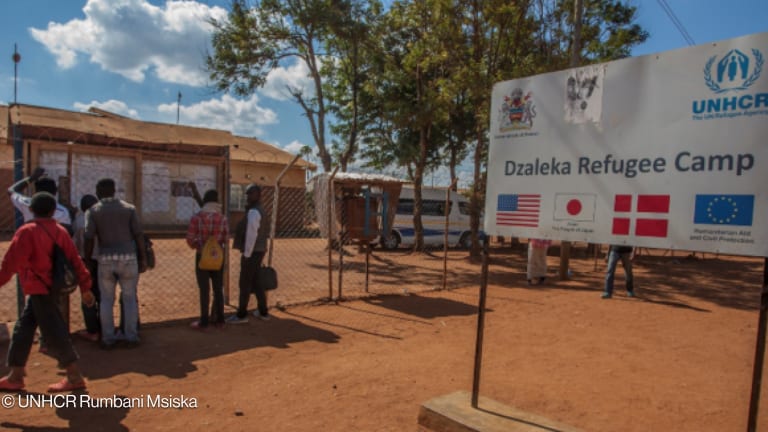
The UN Refugee Agency and the International Organization for Migration are working with governments and partner organizations to ensure refugees and migrants are not left out of COVID-19 vaccination programs.
Refugees as well as migrants in both regular and irregular situations remain vulnerable to the coronavirus, and while vaccine supply has not yet arrived in many host countries, governments must be aware of their obligation to equitable access, said Shabia Mantoo, spokesperson at UNHCR.
“It’s in the interest of refugees — this is a lifesaving intervention, having the vaccines, having treatment. But at the same time, it’s in the country’s interest to make sure that there’s no one on their territory that is unprotected and exposed because that will then hamper progress made in combating the virus and stopping the pandemic,” Mantoo said. “No one is protected unless everyone is protected.”
Mantoo said UNHCR is conducting advocacy work with governments to ensure that they are clear about who is included when vaccination plans are publicized. Often, she said, refugees and other groups are not listed as specific categories when plans detail eligibility requirements such as age or occupation, leaving some unsure about whether they qualify for inoculation in the country where they are currently living.
While some nations — such as Colombia, which is hosting nearly 2 million Venezuelan refugees and migrants — have publicly stated they do not intend to make vaccines available to these groups and will instead prioritize their own citizens, others are being held up as examples of the equitable access for which UNHCR is advocating.
Mantoo called Jordan — one of the first countries that began vaccinating refugees — the “gold standard” when it comes to inclusion. The government is running the online sign-up and administration of the shots, so UNHCR is only able to track the vaccination status of those who live in refugee camps. Reaching those who live in urban areas in the country is more difficult.
“No one is protected unless everyone is protected.”
— Shabia Mantoo, spokesperson, UNHCRBecause refugees in Jordan have high levels of medical vulnerability, Lilly Carlisle of UNHCR Jordan said she expects many of them to be among the first with access under the national plan. UNHCR has been conducting information campaigns via social media, WhatsApp, and community networks to let refugees know they are eligible to register for vaccines and to answer any questions they may have about the process or the shot itself.
“The challenges that we are facing are hesitations towards getting the vaccine. There’s been quite a lot of rumors that are spreading in terms of side effects — or crazy things that anyone anywhere in the world is spreading — and people see them online and think, “Oh, maybe I shouldn’t get it,’” Carlisle said.
Patients receive a text message when it's time for their second dose, and UNHCR helps facilitate transport to a clinic, Carlisle said. The Jordanian government has purchased 3 million doses of the Pfizer-BioNTech and Sinopharm vaccines. And while the entire Jordanian population is 10 million and the country hosts more than 2.5 million refugees, so far around 300,000 people have registered to receive a shot. This means that for the time being, there isn’t the issue of undersupply that many other countries are currently experiencing.
Other countries have professed access for refugees and migrants but have not yet started vaccinating them. Felipe Vargas, advocacy officer at Jesuit Refugee Service in Mexico, said the government plans to include these populations in its plans, but it’s not yet clear how the country will ensure equal access. Information campaigns are needed, he said, to ensure people know they will not be persecuted for having an irregular migration status.
“We are concerned that migrants [will] not attend vaccinations for fear of deportation,” Vargas said. “In the northern and southern border of Mexico, there is a context of poverty and insecurity that could hinder the vaccination campaign.”
JRS is working with partner organizations to encourage all governments in Latin America and the Caribbean to include refugees and migrants in plans, Vargas said.
COVID-19 vaccines are a scientific feat — but lower-income nations are still fighting for equity
As an additional set of higher-income countries are expected to roll out COVID-19 vaccines to their at-risk populations, many lower-income countries remain uncertain for when high-risk members of their populations will also get their first vaccine shots.
“Our position is advocating as hard as we can in a context where there is nationalism, in a context where there’s the feeling that maybe there might not be enough … [vaccines for] everybody, at least not immediately,” said Yasmina Guerda, public health communications officer at IOM. “We spent a year facing a lot of xenophobia and stigma against migrants, foreigners, travelers in general. In that context, we’re trying to say, ‘This is not the moment to not be inclusive,’ and the task is particularly difficult for migrants in irregular situations.”
Guerda said that IOM is not asking for migrants to be prioritized over other groups of people, but rather for governments to ensure they are taken into account in plans. IOM is particularly concerned about migrants who are in irregular situations, she said, because they may lack documentation needed in some countries for access to health care services.
Language barriers and cost can also be obstacles to vaccination access, Mantoo said.
IOM has health personnel in over 80 countries who are poised to help support the rollout of vaccines, Guerda said. While the United Nations has not been formally called upon to assist in the administration of shots, she said IOM — a “related organization” of the U.N. — remains “on standby.”
IOM is advising COVAX, the global facility aiming to ensure equitable vaccine distribution, on the need to include migrants in national vaccination plans, Guerda said.
“Most governments want to do the right thing. It’s not that there’s a de facto bad will. Some governments feel that maybe they don’t yet have the capacity to take care of nonnationals,” she said. “It’s the responsibility, I feel, of … this COVAX effort and this international community to solve these questions together.”
According to Mantoo, of the 133 refugee-hosting countries that UNHCR is coordinating with, 81 have pledged to include such populations in their vaccination plans.
“[We are] trying to engage and find out where inclusion is happening and what the barriers to inclusion might be,” Mantoo said. “It’s still very early days, given that these vaccines haven’t been rolled out across the board. It’s basically still a work in progress.”









